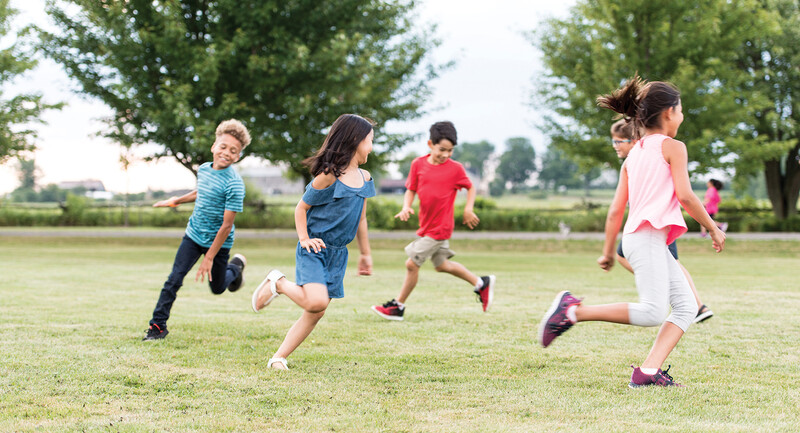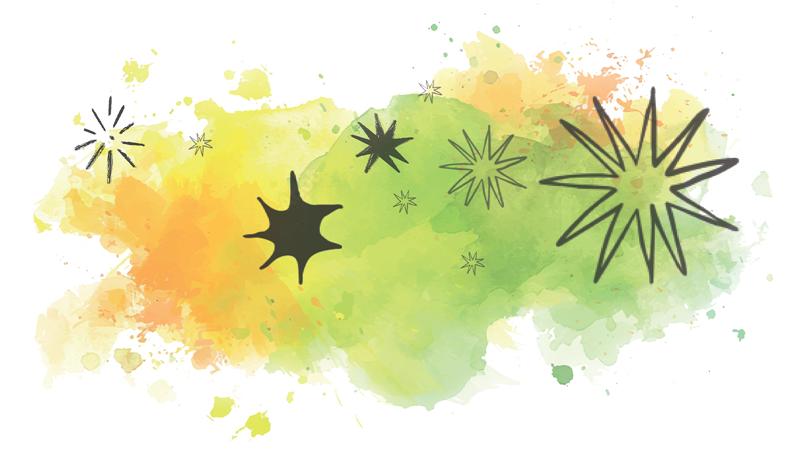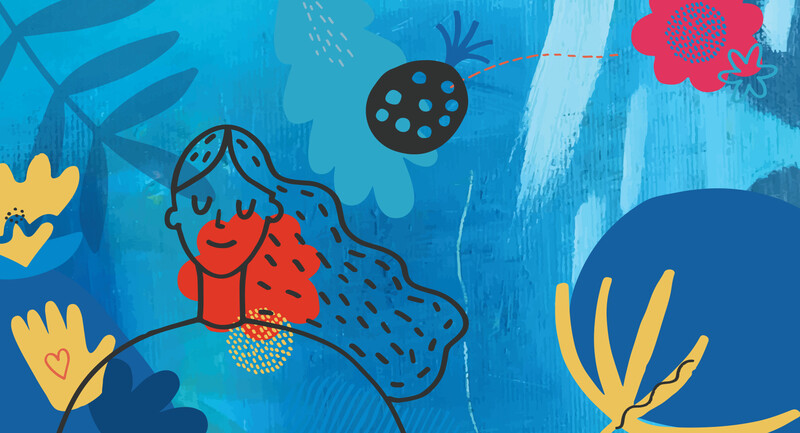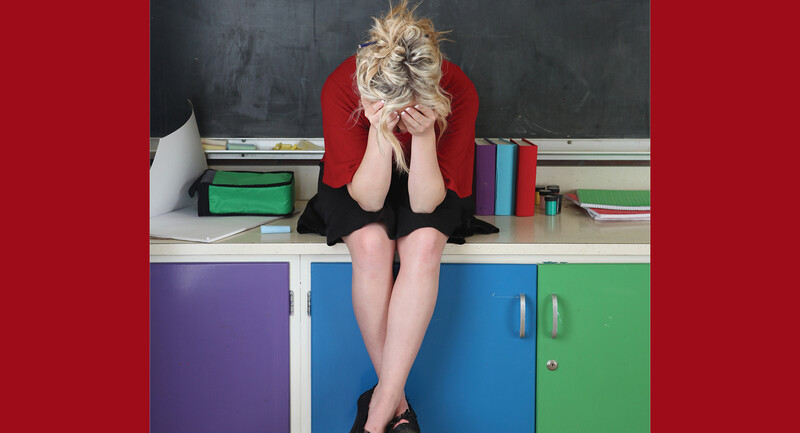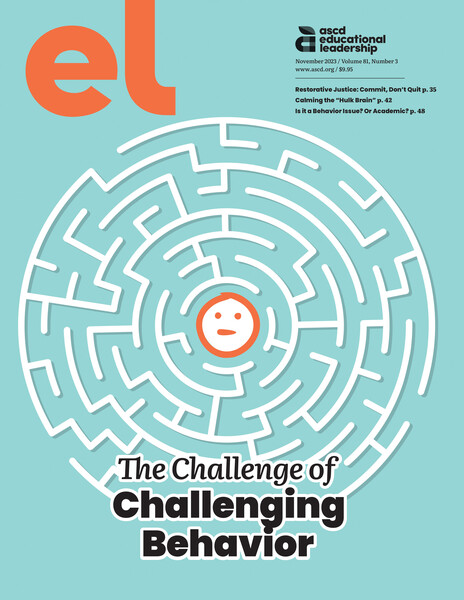We all want to inhabit a world of kindness, integrity, and empathy—to be treated fairly and respectfully by our fellow humans. We teachers especially want to engender this in our classrooms. But sometimes the cooperative and peaceful classroom culture we have envisioned feels just beyond our reach. First of all, we are overwhelmed! With lessons to plan, changing curricular requirements, and diverse sets of learning needs, teachers are being asked to do so much, often with little resources. Second, we are outnumbered! Within seconds, challenging behavior can devolve into a chaotic environment that derails even the most careful classroom management efforts and planning.
Yes, clear boundaries can help many children to understand and respect the behavioral expectations of the classroom, but when a child's behavior is inappropriate, challenging, and upsetting, tightening those boundaries is almost always ineffective. The research in child development shows that harsh punishments like zero-tolerance policies, time-outs, and suspensions do not lead to better behavior. Neither do shame and blame. Instead, they create alienated children, school-to-prison pipelines, and worse (Bell, 2015). What we need to do instead—both in the moment of a challenging behavior and in the longer term—is to help children learn to take responsibility for their actions and the actions of others in their community. We need to teach them prosocial behaviors.
Practicing Prosocial Behavior
All children want to behave well. It is in their best interest (and tens of thousands of years of evolutionary history) to follow the rules of the culture. Thus, when children misbehave, it is always for a reason, and that reason usually corresponds to a lagging skill (Greene, 1998). To acquire the skills which underlie appropriate behavior, children need practice. Feeling empathy for others, for example, is among the most complex of cognitive capacities. It involves seeing the world from another's perspective, plus putting aside one's own needs to feel someone else's pain. There are intricate networks of the brain involved in the development of such prosocial behaviors. But these brain areas are only rudimentarily functional at birth. They must be fine-tuned over time by experience and emotional understanding. In other words, growing prosocial brains takes maturation of the neuronal structures plus relevant and meaningful experience using them.
Agency, Not Obedience
To maximize appropriate behavior, we need our students to be active participants in their prosocial development, not passive and obedient recipients of orders. They have to go through the awkward early stages of navigating challenges and conflicts with others. They need to develop a sense of control—behavioral mastery and fluency—by trying, failing, and trying again. And when they miss the mark (which they will), they need an unconditionally caring person (peer or adult) to let them know that their value and worth is not tied to any behavioral misstep.
To a large extent, we must let kids figure out how to handle social challenges on their own. Agency (having more say, not less) is the reliable path to predictable, prosocial, peaceful behavior. One example of this is letting children decide as a community what the classroom rules or agreements will be and then letting them decide how to handle violations of those agreements. Democratic classrooms and schools give even the youngest learners control over how their community functions together. At the Brooklyn Free School, for instance, every child from ages 4–18 has the same input on the school rules (what they are and how they should be enforced) as every faculty and staff member. When kids feel part of a community, unconditionally regarded by their peers and teachers, given tools to solve problems, and trusted with great responsibility, they do everything they can to behave well. This can occur in any classroom, using circle time or daily meetings or class committees to empower children to make recommendations for handling behavioral challenges.
When kids feel part of a community, unconditionally regarded by peers and teachers, given tools to solve problems, and trusted with responsibility, they do everything they can to behave well.
According to anthropologists, the most well-behaved, well-adjusted, and happiest kids on the planet are children from hunter-gatherer cultures like the Ju/'hoansi people of the Kalahari Desert in Namibia and Botswana, the Batek people of Malaysia, and the Yiwara people of Australia. These kids, though they reside in different parts of the world, have something in common—they get to do whatever they want nearly all day every day. They spend their time in multiage groups of children without adult supervision. Such complete agency allows hunter-gatherer children to practice the values and skills essential to behaving appropriately and functioning socially with one another—autonomy, equality, cooperation, sharing, resolving disputes, and reaching consensus (Gray, 2014).
By stark contrast, kids in industrialized nations, like the United States, are rarely given the gift of unstructured time (with even playtime being run, coached, and closely supervised by adults). Especially in school, kids' days are most often scheduled to the minute, with free time at recess dwindling. Only nine states in the U.S. require a daily recess, and a recent survey showed that 86 percent of teachers have decreased or taken away recess as a punishment or for more work time (Mader, 2022). However, children in the U.S. who do get free time to spend as they please show superior self-regulation skills to their micromanaged peers (Barker et al., 2014). That means that kids who have the opportunity to do the hard work of figuring out how to manage their time also get better at other social skills, like handling their emotions and becoming flexible.
So, how can we right the tight ships of our classrooms and allow our students the agency that will lead to socially complex brains and prosocial skills? We can set up classroom environments and structures that nourish mutual respect, empowerment, and practice by letting kids learn to navigate challenges and solve problems. In my cognitive science research, I've discovered four areas that teachers can focus on to help students develop prosocial behaviors. Here's a mnemonic I created to remember these areas: "Kids behave OK when they: Get to play, have a say, are outside much of the day, and can be blown away." Let's look at each of these more closely.
1. Students need more time to imagine and play.
Play is a fundamental feature of childhood and is critical for shaping the brains and behaviors of animal and human young alike. During play, children practice behaviors which are essential to developing morality (such as trusting, being fair, making deals/social contracts, apologizing, and forgiving). Children who can play freely and use their imaginations exhibit superior prosocial behaviors (like cooperation, concern, and empathy) as compared with kids who do not spend enough time playing. Further, children who spend a significant part of each day playing have more positive peer relationships, and teachers rate them as being more socially skilled (Colwell & Lindsey, 2005). When kids use their imaginations more, they become better at controlling their emotional and physical responses and at taking others' perspectives (Bauer, Gilpin, & Thibodeau-Nielsen, 2021). Imaginative play is not just for recess time and it's not just for young children.
We can make lots of classwork playful and imaginative by adding open-ended and creative ways to solve problems and show learning. From skits and improv sessions to "choose-your-own-end-product" assessments, letting kids work together in creative ways will activate their imaginations and let them practice functioning in groups. In these complex social situations, kids hold each other to fairness and justice. Hearing "It's not your turn, let's try someone else's idea" from a peer is much more likely to change a child's behavior than hearing an admonishment from a teacher.
2. Students should be given more agency and be allowed to solve problems on their own.
Agency—having the power to make moment-to-moment choices, and to decide how to spend one's time—improves children's coping skills, helps them to understand disparities, and teaches them how to be trustworthy. Children who are granted greater responsibility and independence in their lives develop better self-regulation skills and are more self-reliant than children who are tightly controlled. Autonomy enhances self-knowledge, responsible self-agency, self-regulation, and self-direction; it also grows respect for others, negotiation and cooperation skills, and interdependence. If kids never have the chance to make tough choices (or any choices at all), how will they get good at navigating complex and challenging decision making? How will they learn to solve conflicts or to stand up for what is right?
If kids never have the chance to make tough choices (or any choices at all), how will they get good at navigating complex and challenging decision making?
A powerful example of agency, self-determination, and confidence is the Japanese method of mimamoru. Mimamoru involves letting even the youngest children autonomously handle their own disagreements. Since conflict is an essential part of human relationships, learning how to engage in and resolve conflict is central to becoming a competent and ethical member of a social group. In the mimamoru method, inappropriate behaviors, including hitting or stealing someone's toy, are not thought to require adults' intervention. Even the youngest kids work it out on their own. Japanese educators will "bear witness" to the infractions but wait for peers to step in and handle the immediate conflict. Teachers in Japan will even create opportunities for conflict so that children can learn these complex social skills. For instance, a teacher may deliberately prepare less than the needed number of materials for a game to create a situation in which children experience conflict and learn how to share limited materials (Hayashi & Tobin, 2015).
Counterintuitively, if someone in my class is having a hard time doing what is expected of them, I flip the hierarchical script and give them more power. If the culprit is disrupting a lesson because they find it irrelevant or inaccessible, I try to increase their agency both in the short and long term. This may manifest as making them a group leader for a discussion, giving them the opportunity to plan a future class session, or letting them propose an activity or lesson which will engage them and their peers authentically.
3. Students who spend more time outside in nature develop more positive emotions.
For the vast majority of human history, people have lived their days embedded in nature. It is no wonder that studies show that when kids spend more time outside, they are more connected and attentive, report more positive emotions, and have a greater ability to reflect on life problems (Mayer et al., 2009). In one experiment, three groups of Italian children learned in the same school under the same curriculum, but one group participated in an environmental education program consisting of activities outside in nature. At the end of the term, the children who were part of the outdoor education program scored significantly higher on measures of prosocial behavior than the students who did not (Pirchio et al., 2021).
When our students are antsy, or when they are tired and grumpy, bringing them outside will change their behavior. Outdoor environments invoke groundedness almost instantly, and not just for young children. When given a choice, students will almost always choose the outdoors because it activates all their sensory systems. As we have learned from European Forest Schools, and during COVID-19, almost any lesson can be redesigned for the outdoors, usually with better success than being inside. One reason is because outdoor environments promote a more whole-body/mind experience, which enhances social cohesion and engagement.
4. Students should be allowed to be curious and "in awe of the world."
If you have students who exhibit challenging behaviors, it might be because they are bored. While boredom can be a creative motivator—in the short term it can push children to try new things to transcend the state of discomfort—boredom is also stressful. It activates the brain's fight or flight response, shutting down the ability to carefully reason, critically think, problem solve, or make decisions (Goetz et al., 2013). We have to be careful of chronic states of boredom, which are highly associated with inappropriate behavior and poor school performance, including attention issues, reduced effort, and low self-regulation (Schwartze et al., 2020). On the flip side, when our students are genuinely interested in something, their prefrontal cortices (the seat of complex thinking and reasoning in their brains) alight. If we can allow children to open up to their passions and interests and authentically engage with their worlds, they become highly socially conscientious and responsible group members. That is because being genuinely fascinated diminishes the emphasis on minute-to-minute needs and desires, encouraging a child to think bigger, which can help to override impulses.
How can we pique our students' awe and fascination? One way is to let their deepest, most philosophical questions drive some curricular choices. Children get out of the habit of asking questions once they enter formal schooling, which is a shame because kids are natural philosophers and extraordinarily divergent thinkers. To let them really delve deeply into their own ideas and interests for topics of research and discovery is a bona fide track to tapping authentic wonder. This will pay off in terms of caring about their ideas, as well as the ideas of others. Not only will the widened perspective lead to better behavior, but also, when kids are accustomed to questioning their worlds and taking their questions seriously, they will be much more likely to question things that are unjust or inappropriate.
Eliciting Prosocial Behavior
We must beware of taking away valuable learning opportunities from students simply because of our urge for immediate resolutions. Since harsh punishments and strict rules don't ensure prosocial behaviors, we need other, deeper, and more effective ideas. Instead of judging, punishing, or shaming students who need to work on prosocial skills, we should let those students who struggle behaviorally practice taking responsibility and having agency. We can give them opportunities to genuinely grow in their brains and behaviors; to care about their communities; to become confident and solve problems creatively. But to do this, we need to give them more freedom and independence in the areas of social problem solving. When we trust kids, they learn that they are trustworthy, and their ethics emerge accordingly.
